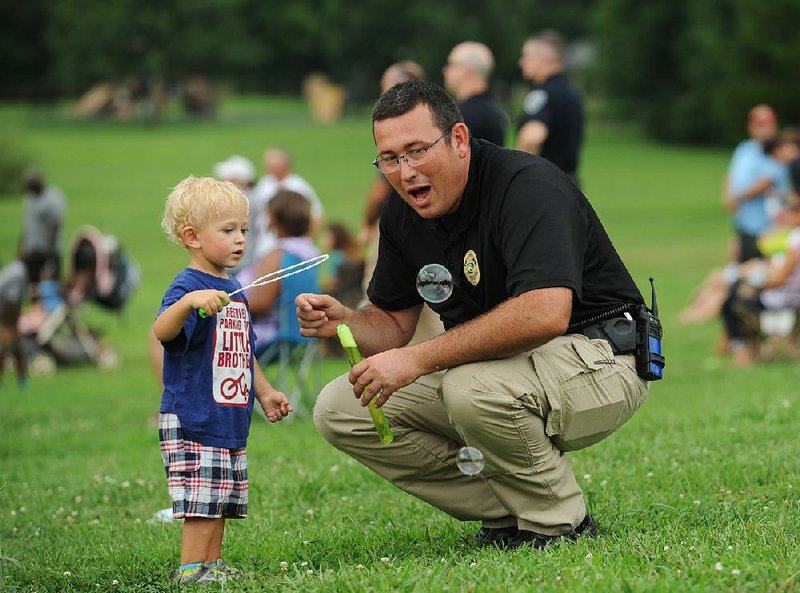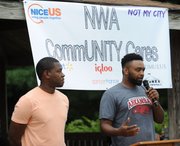FAYETTEVILLE -- A community advisory council for the city's Police Department is in the works, but the mayor doesn't plan to give it the oversight duties of many similar boards across the country.
Police Chief Greg Tabor and Mayor Lioneld Jordan intend to establish what Tabor wants to call the Community Advisory Council. The Fayetteville board would consist of representatives of different demographics like black, Hispanic and gay; members of the religious community; and officials involved with homeless and education issues. The group would meet every quarter, Tabor said.
Complaints
Citizen complaints
2010 — 9
2011 — 11
2012 — 31
2013 — 32
2014 — 34
2015 — 15
Internal complaints
2010 — 10
2011 — 5
2012 — 9
2013 — 16
2014 — 11
2015 — 5
Source: Fayetteville Police Department
Personnel Actions
2010 to 2015
Suspension — 25
Demotion — 1
Resignation in lieu of termination — 2
Termination — 8
Written/oral reprimands — 24*
- from 2010 to 2012.
Source: Fayetteville Police Department
Internal Affairs investigation results
2010 to 2015
Citizen complaints — 132
Sustained — 31
Not sustained — 21 Unfounded — 39
Exonerated — 37
Internal complaints — 56 Sustained — 45
Not sustained — 6
Unfounded — 2
Exonerated — 1
Source: Fayetteville Police Department
Tabor and Jordan don't envision an oversight committee. The board would not field formal complaints from citizens about officers' conduct, but a person could make a general complaint, like if an officer usually patrols a neighborhood without getting out of his car, Tabor said.
"I think from that broad cross-section of people in the community we can get good feedback on what people are hearing, what people's concerns are," Tabor said. "I just think that's a good idea."
Violence by and against police is in the national spotlight with recent shootings in Dallas and Baton Rouge that left eight officers dead and the police killings of Alton Sterling in Baton Rouge and Philando Castile in Minnesota.
Jared Carter, co-founder of Hands Up NWA, said he would like a citizens board in Fayetteville to have oversight capabilities.
Hands Up NWA was among the organizations that protested the April police shooting of Willie Tillman, who died 18 days after being shot multiple times during a traffic stop that became confrontational. Washington County Prosecuting Attorney Matt Durrett determined the shooting was justified, saying Tillman had grabbed Officer Brandon Jones' gun, and that Jones repeatedly had tried to incapacitate Tillman by using nonlethal force.
Citizens should be able to make a complaint against a police officer with someone other than the Police Department, Carter said. The type of board Jordan and Tabor envision is a start in that direction, he said.
"I want to credit Mayor Jordan for being a progressive guy, but we have to have some type of accountability for these guys," he said. "You can't hold them to be accountable internally and make sure that everything is being gone over with a fine-tooth comb."
21st Century Policing
Tabor attended a conference in Washington last week that delved into recommendations in the 2015 report by the President's Task Force on 21st Century Policing. Those recommendations included more comprehensive collection of police data, ways to avoid or address biased policing and establishment of civilian boards to foster a dialogue between police and the community.
Jordan said he can set up the board under his administrative powers, and he would have final say on who is on the board. He said he'd like to see an odd number of people, like seven to nine, who would represent the diversity within the city.
A citizen advisory board can't dictate police policy or directives according to state law, because that authority is designated to the mayor, City Attorney Kit Williams said.
Complaints against officers are initially handled by the department's Office of Professional Standards, which will either forward them to the officer's supervisor or, for more serious allegations, to Tabor. Jordan has the power to override or otherwise review the chief's actions.
Williams said he is against the idea of Fayetteville having a civilian board that would receive formal complaints against the Police Department.
"It's kind of like 'if it ain't broke don't fix it,'" he said. "We've got a pretty good system going, and there are some inherent pitfalls in having another group try to jump into the area and start trying to do that kind of work."
The Police Department has not had an allegation that it violated someone's civil rights upheld in court "in this century," Williams said.
From 2010 to 2015, eight Fayetteville police officers were fired and two others resigned in lieu of termination. Twenty-six were suspended or demoted, according to statistics from the department. The department didn't note if the personnel actions involved racial bias or excessive force -- issues at the heart of recent protests across the country.
The department fielded 132 citizen complaints and 56 internal complaints in that same time period. Internal inquiries determined that in the majority of the citizen complaints, 97, allegations were unfounded or lacked evidence to support them.
Forty-five of the 56 internal complaints, where an officer or department employee filing a complaint against a fellow officer or employee, were sustained.
Differing duties
Having a group of people outside a police department who review complaints can reduce the likelihood of an investigation being tainted by personal relationships, even with a department of 123 officers like Fayetteville, said Rita Sklar, executive director of the Arkansas chapter of the American Civil Liberties Union.
Prosecutors work closely with police, as do members of a department's internal affairs division, which could present a conflict of interest, she said. Having an outside entity where someone can file a complaint would be useful for any municipality, Sklar said.
"I think it is important," she said. "The police do work for the people and are accountable to the people."
The National Association for Civilian Oversight of Law Enforcement is a nonprofit organization whose members are involved in some sort of civilian advisory, engagement or oversight with their local police departments.
Civilian oversight or advisory councils for police departments began forming in major cities like Los Angeles and New York in the 1920s and 1930s. The idea's popularity has grown recently as police shootings have gained national attention, said Liana Perez, the association's director of operations.
A citizen oversight committee rarely has authoritative power over a department, she said. It usually can make recommendations, but the police don't have to follow them, Perez said. Some large cities' advisory boards have their own investigators who look into cases when a complaint is filed against an officer.
Fayetteville, Springdale and Rogers each have long-standing civil service commissions. Their duties focus on reviewing eligibility for appointments and promotions within the police and fire departments and hearing appeals of disciplinary actions taken against police officers and firefighters, according to those cities' websites.
If a complaint is lodged against an officer with the Civil Service Commission in Fayetteville, the complaint is forwarded to the police chief, who determines how it should be handled, Williams said. If the complaint is against the police chief, then the mayor will review it, he said.
Spokesmen for Springdale, Rogers and Bentonville said there's been no discussions of forming civilian advisory boards. Each city's police department handles community relations in different ways. In Bentonville, for example, the department's public information officer engages in community issues and concerns and is active with various community groups, Mayor Bob McCaslin said.
The key element of citizen advisory boards is the outside review and ability to make recommendations, whether it's a monitor or an auditor or even a board, Perez said. The common thread is engagement, even though their duties vary greatly across the nation, she said.
"That kind of goes a long way in what we call building bridges between the communities and the police departments that serve them and vice versa."
The members of a civilian advisory or oversight committee are not just uninformed residents making judgment calls on what the police should or should not do, Perez said. Each member gets acclimated to how a department operates, often taking part in or observing the training that an officer goes through.
Keeping connected
Not My City, another Fayetteville group, held a community meeting July 12 at the Fayetteville Chamber of Commerce with Tabor, Sgt. Craig Stout and Cpl. Dallas Brashears, church members, political activists and others.
Not My City plans to hold a meeting the first Tuesday of every month in which citizens can talk with police about concerns they might have, said Jeremy Clark, the organization's co-founder.
Clark commended the city on starting its own community board, saying any opportunity to foster discussion is good. Giving that board an oversight role is probably unnecessary, he said.
"I guess it'd be good to have a committee to review stuff like that, but we might not have that much to review," he said.
Community engagement is more important than ever, Tabor said. So far in Fayetteville, relations seem positive. The officers are getting awfully tired of pizza being delivered to them as a token of appreciation, he joked.
Creating a community advisory council would only further that good nature, he said.
"From this, we learn more about what the community's concerns are, and they learn more about how we operate," he said. "I think that just makes everybody understand each other better."
Not My City has worked to educate people on police policy and procedure like what an officer will say and do during a traffic stop. Clark said the purpose is to keep Fayetteville from becoming a place of contention between police and the community, like other cities have become.
"For the most part -- the citizens, especially the ones in the black community here and the Police Department -- there's not a huge disconnect there," he said. "But, it could get ugly tomorrow."
NW News on 07/31/2016


